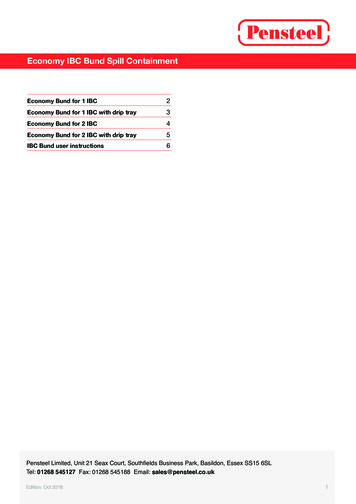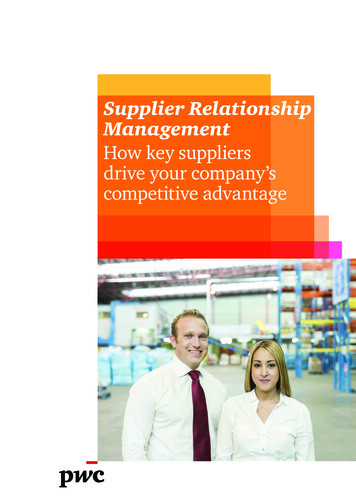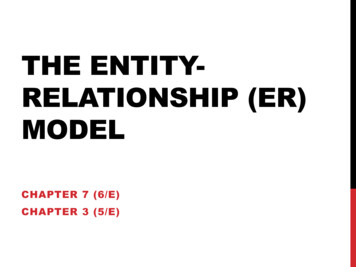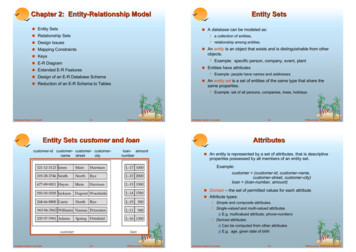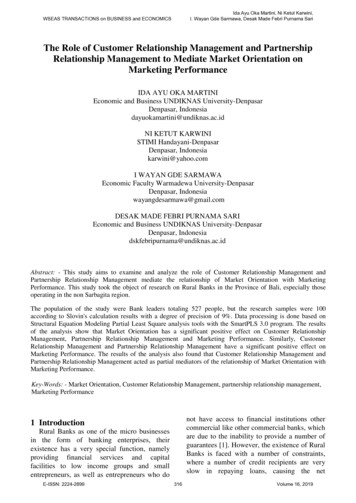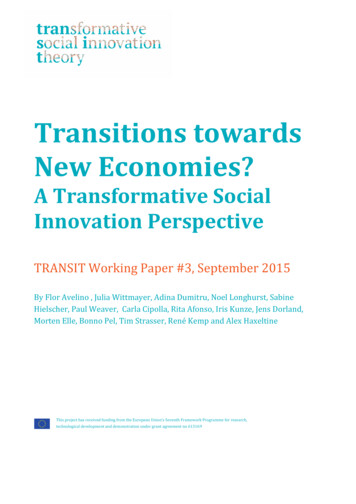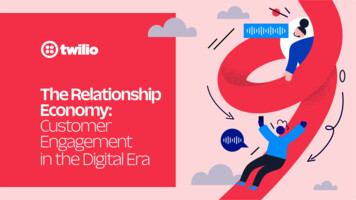
Transcription
The RelationshipEconomy:CustomerEngagementin the Digital Era1
ForewordForewordProfessor Andrew StephenDeputy Dean & L’Oréal Professor of MarketingSaïd Business School, University of OxfordThe tumultuous world in which we live provides businesseswith many challenges. A critical one relates to how theycan best engage with customers who themselves arechallenged by the rapidly changing and uncertain world.Customers nowadays want more from companies. Yes,they still want (as they always have) high quality productsand services at a fair price, as well as prompt and courteousservice. But in today’s world they also want relationshipswith businesses that engender trust, are personalised,are responsive and flexible. Successful businesses knowhow to go from transacting with customers to building andmaintaining positive relationships and, more importantly,see that having great customer relationships isstrategically vital for driving growth in turbulent times.To win in the current economic climate, companies mustinvest in building and maintaining valuable relationshipswith their customers.transactional convenience or efficiency, which very oftenequates to things happening quickly. While the study showsthat “speed” is still an important aspect, it is not the onlyone and in my view is a “table stakes” element. Customersexpect speedy responses, quick turnarounds, and rapidsolutions to their problems. Businesses need to do this but,in my view, rarely these days can just “being quick” be asource of competitive advantage.What, then, should businesses focus on to build trustwith customers and, thus, develop lasting customerrelationships? The study suggests that expertise (orknowledge) and emotion are two additional aspects thatbusinesses need to focus on. Knowledge to me is morethan expertise. Rather, it is providing the most appropriateinformation to customers at the right time and in the rightformats. It was very interesting to me to see the surveyshowing a distinct preference for customers talking tocompanies in real-time, i.e., voice calls.The Relationship Economy: Customer Engagement in theDigital Era provides clear guidance, backed by data, on whattrust-based customer relationships should look like todayand into the future. The study by Twilio featured in thisreport suggests that customers want more than simple2
ForewordThis is presumably because customers see this form ofcommunication as a way to tap into knowledge. Talkingto a human — actually hearing their voice! — appears tobe important today even when we have other (seeminglymore efficient and less time-consuming) modes such asemail and live chat. However, this old-school preferencefor voice-based interactions needs a level of sophisticationto be relevant and valuable. Company representativeshave to be able to offer their expertise and provideknowledgeable answers to customers’ questions in apersonalised, tailored manner. This requires the use offirst-party customer data behind the scenes to help guidehuman-to-human conversations. In this sense we shouldthink of service agents on the other end of a call as beinghyper-knowledgeable experts, as their own knowledgecan be augmented in real-time by data-driven insights andrecommendations gleaned from analytics and machinelearning on customer data.The other “pillar” highlighted in this report is emotion.Just like knowledge, another inherently human element.It seems from the study that the emotional aspectsof business-to-customer interactions continue to beimportant to people. Customers want that “human touch”,even when engaging via digital channels, and emotion ispossibly what makes things feel more human. Friendlinessis important, of course, and I would also suggest that itis vital for businesses to find ways to communicate thatare emotionally attuned to customers and empathetic.This requires businesses to really know their customers –and know each customer – since what one person needs,emotionally, in an interaction may very well be differentto what another person needs. Similarly, what a customerat one stage of a journey needs will invariably be differentfrom what they would need at a different stage. Emotionallyattuned, personalised customer experiences may not bethe easiest thing for businesses to provide, but it appearsfrom this study that it will be worthwhile to businesses andtheir customers if this can be achieved.This study’s findings are thought-provoking. They serveas a reminder that the human touch is vital in business,even when technology plays such a central role in howbusinesses interact with their customers and deliverservices. In fact, the way forward for businesses in anincreasingly technology-enabled world – let alone duringtough, turbulent times – does appear to be about findingclever ways to give customers a more human experience.Human centricity in a digital world is how businessesmust think and act in order to grow, build trust withtheir customers, create loyalty, and, ultimately, thrive inchallenging times.3
ContentsContentsIntroduction1. Efficiency2. Expertise3. EmotionSpotlighton the UKConclusionP5P7P9P11P13P144
ExpertiseIntroductionIntroductionThe last couple of years havebeen extremely turbulent forconsumers. The pandemicforced people everywhereto spend more time onlinethan ever before, and nowrising living costs and fearsof an economic recession areplacing new strains on tighthousehold budgets.EmotionEfficiencyCustomerengagementThe price of goods is high, and there has already been adownturn in discretionary spending on goods and servicesthat were previously considered indispensable in thepandemic. This has given rise to a relationship economy,in which the businesses that win are the ones that buildgenuine, personalised relationships with their customers.Businesses that focus on developing these relationships, byproviding the information their customers need quickly andthoughtfully, will in turn see a benefit to their bottom line asthey gain trust and loyalty.5
IntroductionBut what do these relationships look like? And how canbusinesses get them right? Are consumer habits shiftingfurther towards digital instead of human interaction? Whatmakes consumers more likely to recommend a brand, trustit, or buy from them again? And are organisations makinginvestments in the right areas to respond?This is what we wanted to explore and bring to light withthe first iteration of The Relationship Economy: CustomerEngagement in the Digital Era. Twilio surveyed over 8,700people across the UK, Spain, Germany and France, tounderstand the key priorities for customers when interactingand cementing relationships with brands in 2022.Conventional wisdom is that speed is the only thing thatcustomers truly care about. But our research undercutsthis idea: in fact, positive brand relationships are builtthrough an equal mix of fast and slow interactions to meetthe three key pillars of consumer convenience: efficiency,expertise, and emotion.Our results show that at their core, customer expectationsfor rapid service haven’t changed. Customers expect quickacknowledgement at a minimum, and the longer they wait tohear from you, the more likely they are to become frustrated.However, in periods of crisis, the organisations that succeedwill be the ones that combine speed with demonstrableengagement and care. They are the ones that captureattention effectively, personalise their services using firstparty customer data, and ensure they are available in theways that customers want. In other words, businesses mustgo beyond internal improvement initiatives, show that theyunderstand who they’re targeting, and invest in addressingtheir customers’ emotional needs. This report will detailhow brands can achieve this.The three building blocksof consumer convenience: Efficiency – you can solve the customer question orissue in the fastest possible time. Expertise – you have the knowledge andunderstanding to know the answer to customerquestions across every part of your business, fromproduct details, to stock levels, shipping informationand more. Emotion – you speak to customers withunderstanding (i.e. as a human), are flexible andempathise with customer needs and issues.6
1. Efficiency1. EfficiencyWe instinctively understand why speed is so importantto customer experience because we are all consumersourselves. We want our issue to be addressed quickly,whether it is a delivery, solving a problem or being able toaccess the information we are looking for. Speed buildsconsumer confidence, trust and advocacy because it showsthat an organisation is efficient, well run and experienced.And getting your customers the answers they need quicklyis the first step to building that all-important relationship.But where is speed most relevant? While brandsunderstand speed is important and are constantly tryingto improve it, they might face resource restrictions, such as“a skills gap and lack of contact centre staff. Understandingwhere and how to apply speed will be key to servingcustomers and deepening their relationships in the longterm. Our research shows that when customers contacta company, it is most commonly because they have aproblem [23%], followed by ‘need more information’ [17%].Consumers contacting a brand have a sense of urgencybecause they have likely either tried to resolve it themselvesor it requires an immediate response. This explains why‘getting an answer ASAP’ was identified as the most importantthing for consumers when contacting a brand [25%].“Customers expect speedy responses, quickturnarounds, and rapid solutions to theirproblems. Businesses need to do this but,rarely these days can just “being quick” bea source of competitive advantage.”Professor Andrew Stephen, deputy dean & L’Oréal professor of marketing,Saïd Business School, University of OxfordWhen customerscontact a brandor organisation,it is most likelybecause they:23%Have a problem17%Need moreinformationIt is also no surprise to see the importance of speedto organisations hoping to obtain repeat business andrecommendations too. ‘Efficient service’ was the secondmost popular answer when asked why customers woulduse a company again [39%], and again for ‘what would makeyou most likely to recommend a brand to a friend, familymember or colleague’ [37%].But there is more than meets the eye here. One of the mostrevealing results was what consumers felt to be the mostimportant thing when contacting an organisation. Surveyrespondents weighted expertise and attitude (i.e. emotionalconnection) as equally important to speed. This suggeststhat speed is not the be-all and end-all that companiesoften assume it to be. Speed may be the first thing onconsumers’ minds when approaching a brand, but in termsof building lasting connections, it is far from the only criticalelement to engaging in the relationship economy.7
1. EfficiencyBusinesses are aware of and understand the importance ofspeed. The real surprise is how often they fail to address theother key needs of their customers - expertise and emotion.Organisations need to consider their full portfolio of customertouchpoints to ensure speed is applied where it is needed most,for instance in the case of credit card fraud or emergency medicalsupport. And as we will later explore, they also need to deploydeeper and more human engagement that fosters strongerconsumer relationships in other areas. These elements are at theheart of engaging customers in the relationship economy.Solutions and case studies Twilio Flex – the programmable contact centre - givesbrands the tools they need to deliver personalised customerexperiences, all on one powerful platform - visibility on asingle platform for agents goes a long way to ensuring thatthey have the background to issues and conversations whenspeaking to a customer, avoiding the need to repeat theissue over and over again. Case study: TravelPerk – The Barcelona-based globaltravel management platform uses Twilio Flex to enable itto build a personalised experience which is customisablefor agents. Customised tools aligned to agents’ workflowallow TravelPerk’s agents to more quickly serve customers—with context for each customer housed all in one place. Thesimplified agent workflow was immediately reflected inTravelperk’s NPS scores, which reached 95%.8
2. Expertise2. Expertise““Investments that companies have beenmaking into tech alone haven’t been working.Relationships are the most important thingthey need to invest in.”Sam Richardson, customer engagement consultant, TwilioIf speed is the first building block of the relationshipeconomy, knowledge is the element that begins to cementthat relationship between consumer and organisation. In ourprevious section, we saw how some elements of customerservice have not changed: consumers want fast interactions.But more surprisingly, they equally want knowledgeable andfriendly human interactions where appropriate.Our survey results show that consumers prefer voice calls– it was the most popular response when asking aboutpreferred communication methods [36%], with email adistant second [25%]. Calls are also seen as the easiestoption to engage [30%]. However, for many businesses,voice is unlikely to be the preferred method, as it is people-heavy and expensive. Those that offer a diverse range ofengagement channels will know that a customer serviceagent supporting on WhatsApp, chatbots or via SMS, islikely able to provide a similar level of customer support,while handling several customer conversations at once,improving the overall speed of resolution. More importantly,having a person behind written communications means theend-user can still feel a genuine connection with the personthey’re interacting with.So why the preference for this communication option?In part, it comes down to knowledge. Our results clearlyhighlight that in addition to speed, consumers desireinformed communication. Customers call because theyneed help. They’ve generally tried other avenues to resolvethe problem, and by the time they reach someone in acontact centre they are frustrated. This is a difficult situationfor both the agent and the customer. If speed is whatcustomers feel is the basic requirement for achieving theirgoals, knowledge and expertise are what help move themfrom a transactional purchase to a deeper, longer-termrelationship. Slower engagements are crucial in creatinga lasting connection that goes beyond mere functionality.It is what enables customers to make informed decisionsand to do so comfortably. Put simply, by demonstratingyour knowledge and expertise to existing and potentialcustomers, you are inviting them to trust your brand.When engaging with abusiness or organisation, whattasks are the easiest to do?12%finding out aboutan organisation’sdiversity, equity andinclusion credentials11.5%sustainabilitycredentialsOur results show that despite expertise being stronglydesired by consumers [24%], it is often the most challengingaspect of engagement. All of the knowledge-based tasksperformed worst across the survey. For example, findingout more about a company appears to be a consistentbarrier for consumers. Only 13% found it easy to ‘find outwho is the logistics partner for delivery of an item’, despite‘need tracking information’ being one of the top threereasons why customers contact a brand. Similarly ‘findingout about an organisation’s diversity, equity and inclusioncredentials’ and ‘sustainability credentials’ were identifiedas difficult, with respectively just 12% 11.5% finding thiseasy, despite the topics’ rapidly growing importance.9
2. ExpertiseFinding this information will continue to rise in importancefor customers in the initial research phase, and those thataren’t able to provide it risk losing out.This knowledge gap also extends to organisations’ staff andtheir understanding of their customers. ‘Knowledgeableservice’ was identified as one of the three key reasonsfor using a company again [31%]. In 2022, attrition rates incontact centres are high. One of the top reasons cited is thatqueries have become more complex, and support agentsoften do not have the tools or support to resolve thosetrickier issues. This is adding to ongoing challenges suchas staff shortages, increased volume of calls and longeraverage call times.Businesses must therefore ensure that customers haveaccess to staff with accurate information at their fingertips- from what a customer has ordered previously, throughto sizing, preferred price brackets and interaction history.Contact centre agents must be armed with the knowledgeand tools they need in order to solve customer issues. Ontop of this challenge, pricing and quality will always play akey role in developing a relationship with consumers. Thetwo most popular answers to the question of what wouldmake consumers most likely to trust a brand were ‘fairpricing’ [44%] and ‘good quality of products’ [43%]. So it isimportant to understand customer preferences in theseareas in order to point them to the right products.To foster consumer relationships that last, businessesshould not be blinded by overly focusing on speed ofresponse, and instead also address the need to bettersurface the information that people are looking for. Usingfirst-party data is an essential piece of this puzzle, allowingorganisations to direct customers to well-organisedinformation during the research phase of their purchase.It also allows them to better understand customerpreferences, and equip customer service agents withthe knowledge they need to more quickly and accuratelyresolve queries.Solutions and case studies Twilio Flex and Twilio Segment – a leading CustomerData Platform (CDP)1 – make it possible for brands togain a deeper understanding of their customers topower personalised communications across everychannel, driven by their own first-party data. Case study: Vista – A global leading design andmarketing partner – uses Twilio Segment to createcompelling personalised experiences forcustomers and embrace a culture of experimentationacross its business. Twilio Segment provides Vistawith a centralised, single source of truth for customerdata, so they can continually test new messagesand offers to engage customers with enhancedpersonalised experiences.1Twilio is IDC’s leading customer data platform based on 2020 market share.10
3. Emotion3. EmotionHuman connection underpins the relationship betweenorganisations and people. One might expect that ifcustomers can find accurate information quickly, then theywould be satisfied. But our results show that somethingis often missing. Despite (and in some cases, perhapsbecause of) advances in technology and several years ofreduced human contact during the pandemic, consumersstill desire human interaction to achieve certain goals. Infact, 62% of consumers now expect personalisation from abrand. Organisations need to become adept at bridging theonline/offline gap to provide the magic moments that shopvisits used to. Some examples include loyalty schemes toincentivise your customers to place bigger orders – similar“to a ‘gift with purchase’ display at a department store.Or creating a personalised website dashboard view forreturning customers – like when a local shopkeeper usedto know your order and remembered to hold back specificitems for you.In our survey, we looked at consumer preference for ‘morehuman’ or ‘more digital’ interactions for a variety of tasks.Time and time again, we can see a narrow preference formore human interactions over more digital ones, even inareas where more digital might mean quicker outcomes.Some of the strongest weightings included ‘ask a question’[74% v 26%] ‘ask for product or service support’ [69% v 31%]and ‘connect with a community’ [62% v 38%]. The questionfor companies is how to build human connection into everypart of their digital interactions.Customers want to feel they are buying from a brandoperated by people with similar values to themselves.Digging deeper, we asked what organisations consumerswould be happy to receive personalised communicationsfrom. Personal interests and topics which are more likelyto reflect a particular ideology such as travel and holiday[35%], health and fitness [29%], recipes and food [27%] andfashion [24%] were ranked highly, while more functional andeveryday tasks, such as financial wellbeing [19%] and utilities[16%] were ranked lower.“Organisations must not become focused ondigitisation at the expense of inclusivity. Theyneed to take a thoughtful, human approach,personalising the options available dependingon the needs of individual consumers.”Sam Richardson, customer engagement consultant, Twilio11
3. EmotionTo be successful, it is essential for businesses to personaliseto optimise, using first-party data to get the most outof customer support staff, and creating more humanconnections by building emotional intelligence (EQ)into the right kinds of digital interactions. More repeatpurchases mean more first-party data, which helps todrive the availability of more knowledgeable channelsfor communication, which in turn drives speed. Gettingall of these elements to work in tandem is at the heart ofdeveloping a strong relationship with your customers.What makes youmost likely to usea company again:What would makeyou most likelyto recommenda brand:What would yoube more happy toshare details for:42%37%24%friendly serviceefficient serviceloyaltyprogrammeOur survey showed that there is perhaps no moreimportant factor in determining repeat purchases thanemotion. Friendly service was the most popular answer fordetermining if consumers would reorder from a company[42%] and for determining if they would recommend thebrand to a friend, family member or colleague [37%], aswell as being a common motivation for sharing personalinformation [22%].These results should give organisations that have prioritisedautomation-driven speed pause for thought. With inflationpushing the cost of goods up, customers are likely to expectmore from brands. That means greater price sensitivity andhigher expectations of customer service.Solutions and case studies Twilio Segment enables businesses to createpersonalised experiences that will go a long wayto adding the emotional intelligence (EQ) elementconsumers want so that they feel organisations trulyunderstand their desires and interests. Case study: Skilling – a Scandinavian-ownedfintech company – uses Twilio Segment to createa single source of truth for customer data, enablingteams to deliver personalised marketing campaignsand support the company’s strategic focus oncustomer retention.12
Spotlight on the UKSpotlight on the UKUK consumers arefinding it harder to reachorganisations than everbefore, and when theydo make contact, theirtop priority is aknowledgeable advisor.Compared to the other countries surveyed, the UK wasthe only country to find that businesses are now harderto reach than before, with nearly two fifths [39%] ofrespondents selecting this. The data also suggests thatthe reason for this could be that it takes too long to get aresponse, with 27% expressing this view, and 30% alsociting that everything is online now. This final point hints ata negative perception of digital interactions, which could beimproved by more thoughtful engagement, based on firstparty data insights into consumer priorities.But the survey suggests that this could be exacerbatedby businesses taking too long to provide a response, withover a quarter of UK consumers [27%] expressing that thiswas the reason for their negative view. Concurrently, UKrespondents cite ‘friendly service’ as the most commonreason to use a company again [44%]. The interplay ofefficiency and emotion again comes to the fore here:channels like WhatsApp can help pick up queries morequickly, while human interactions with contact centre staffcan cement the customer relationship over the longer term.UK organisations looking to weather the coming economicstorm should therefore target resources at enabling quickerresponses in the first instance, but prioritise the training ofcustomer-facing staff to maintain relationships with buyersthrough slower, more human connections.What is the most importantreason that you think it isharder to contact brands:27%it takes too longto get a response30%everythingis online now13
ConclusionConclusion““Perhaps counterintuitively, the moredigitally enabled businesses become, themore vital it is to adopt a human-centricapproach in order to successfully acquireand retain customers. Even in digitalchannels, ensuring that all interactionswith customers are as “humanised” aspossible is critical.”Professor Andrew Stephen, deputy dean & L’Oréal professor of marketing,Saïd Business School, University of OxfordThe results of our survey make it clear: in the relationshipeconomy, the success of a business is built on the strengthof the connections it creates with customers. Customerswant speed, but this hides two other key attributes tobuilding a strong relationship in challenging economic times:expertise and emotional connection. In the relationshipeconomy, customer service and brand loyalty drivecustomer decisions. Despite this revolution in the businesscustomer relationship, many businesses still need to makesignificant progress toward developing their ability toengage with it. Recent research shows 52% of consumersstill want better engagement from the brands they interactwith - despite many industries delivering improvedresponse times during the course of the pandemic.Customers expect to have friendly interactions withorganisations they engage with, but this often onlyblossoms in the face of expertise and human interaction. Alarge part of those human connections are ultimately builtupon your customer support agents. As the primary humanface of your business, customer support staff will remainamong the most important business assets. In many ways,customer expectations haven’t changed at all: if they have aproblem, the people buying from you simply want a solution.Businesses’ key priority should be to deploy their supportagents across multiple touchpoints, armed with the best toolsand information - to ensure successful customer interactions.Delivering on customer expectations will create the kindof customer satisfaction and loyalty that hinges on greatcustomer engagement. As we enter more challengingeconomic times, the businesses that prioritise thisrelationship building will see the greatest rewards. Trustand loyalty are not things that can be built rapidly. It takesinvestments of both time and resources. But businesseschallenged by the ongoing economic conditions will feelits absence more acutely. Twilio’s State of CustomerEngagement Report 2022 found that 61% of consumerssay they’ll stop using a brand if their experience isn’tpersonalised. Similarly, a report by Deloitte found thatcompanies that focus on the human experience are twiceas likely to outperform their peers in revenue growth overa three-year period and have 17 times faster growth thanthose that do not.In other words: human connections matter.Ultimately, these great connections begin with greatdata. Unlocking the power of first-party data is key tobetter understanding customer journeys and improvingsupport agents’ access to insights and data, which willultimately foster the deeper connections businessesneed to thrive in the relationship economy.14
ConclusionTo learn more about how you candeepen your customer relationships,contact Twilio todaySam Richardson,customer engagement consultant, Twiliorelationshipeconomy@twilio.com15
3 This is presumably because customers see this form of communication as a way to tap into knowledge. Talking to a human — actually hearing their voice! — appears to



